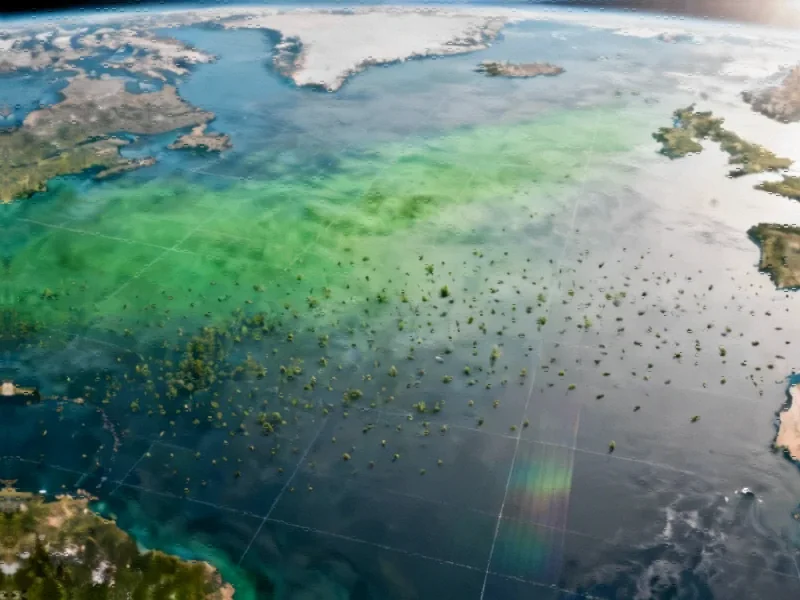Alarming Decline in Ocean Productivity Revealed by Advanced Data Analysis
Groundbreaking research utilizing sophisticated computational methods has revealed a troubling trend in our planet’s marine ecosystems. The world’s oceans are experiencing a significant reduction in greenness, indicating a decline in phytoplankton populations that threatens the Earth’s natural carbon sequestration capabilities. This finding represents a critical development in our understanding of how climate change impacts marine biological systems and global carbon cycling.
The study, which analyzed daily chlorophyll concentrations across low to mid-latitude oceans from 2001 to 2023, employed deep-learning algorithms to process vast datasets from satellite observations and monitoring vessels. Researchers documented an annual decline of approximately 0.35 micrograms of chlorophyll per cubic meter, with coastal regions showing twice this rate and river estuaries experiencing reductions more than four times greater.
Implications for Global Carbon Management and Climate Policy
The declining phytoplankton populations translate to a 0.088% annual decrease in the ocean’s carbon sequestration capacity, equivalent to 32 million tons of CO2 that remains in the atmosphere each year. “The decline in surface phytoplankton’s carbon sequestration capacity has profound implications for the carbon cycle,” noted Di Long of Tsinghua University, highlighting concerns about future global emissions reduction efforts.
This research provides crucial context for understanding broader industry developments in environmental monitoring and climate technology. As the scientific community grapples with these findings, the pressure increases for innovative solutions to address the weakening of Earth’s largest natural carbon sink.
Scientific Mechanisms Behind the Ocean Color Shift
The changing hue of our oceans stems from the disruption of phytoplankton ecosystems, microscopic marine organisms responsible for nearly half of global photosynthetic activity. These creatures contain chlorophyll, the green pigment essential for converting sunlight, water, and carbon dioxide into oxygen and energy through photosynthesis.
Scientists attribute the decline to ocean stratification caused by global heating. As surface waters warm, the temperature difference with deeper, colder water increases, creating a barrier that prevents nutrient mixing from the depths. This vertical nutrient transport blockage starves phytoplankton of essential elements for growth and reproduction.
Michael Mann of the University of Pennsylvania emphasized the significance of these findings: “This is the first study to robustly demonstrate that we are seeing a decrease in the greenness of the ocean, indicating a lowering of marine productivity, constituting yet another threat to humanity associated with fossil fuel burning.”
Contradicting Previous Research and Regional Variations
The current study challenges earlier research that suggested increasing algal blooms in certain ocean regions. The comprehensive analysis acknowledges regional variations and the influence of agricultural runoff and other human activities but concludes that the overall trend shows a “significant decline” in phytoplankton across low and mid latitudes.
These findings highlight the importance of advanced recent technology in environmental monitoring. The sophisticated data processing methods used in this research represent a significant advancement over previous approaches, providing a more accurate picture of global ocean health.
Broader Implications for Marine Ecosystems and Human Society
The reduction in phytoplankton has far-reaching consequences beyond carbon sequestration. These microscopic organisms form the foundation of marine food webs, meaning their decline threatens fisheries and aquatic biodiversity. Additionally, phytoplankton generate approximately half of the world’s oxygen, making their health directly relevant to atmospheric composition and quality.
The research team recommends that policymakers analyze marine ecological environments in coastal areas and develop countermeasures, including improved management of agricultural fertilizer, sewage discharge, deforestation, and water pollution. These findings come at a critical time as the world faces increasing pressure to meet climate targets amid market trends favoring sustainable technologies.
Technological and Policy Responses to a Changing Marine Environment
As the scientific understanding of ocean ecosystems evolves, so too must our approaches to monitoring and conservation. The sophisticated computational methods used in this study represent the cutting edge of environmental science, demonstrating how related innovations in data processing can reveal previously undetectable planetary changes.
The weakening of the ocean’s carbon absorption capacity presents additional challenges for international climate agreements, including the Paris Accord. With Earth’s largest natural carbon sink losing efficiency, emissions reduction targets may need reassessment, and technological solutions for carbon capture may become increasingly vital.
This research underscores the interconnectedness of Earth’s systems and the urgent need for comprehensive approaches to environmental management. As Di Long cautioned, “The decline in ocean carbon sequestration capacity means that we may face greater emissions reduction pressure than expected,” highlighting the complex relationship between natural systems and human industry in addressing climate change.
This article aggregates information from publicly available sources. All trademarks and copyrights belong to their respective owners.
Note: Featured image is for illustrative purposes only and does not represent any specific product, service, or entity mentioned in this article.
